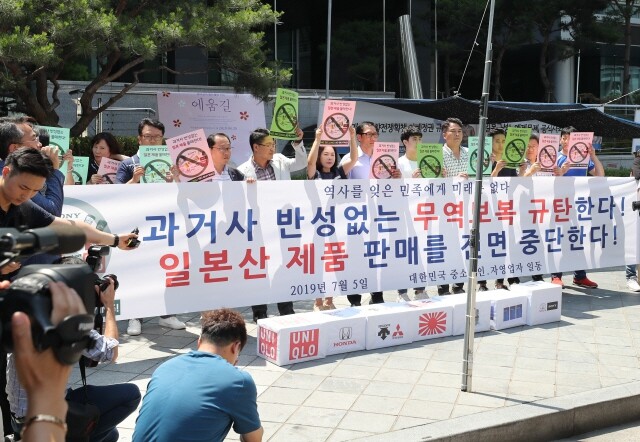hankyoreh
Links to other country sites 다른 나라 사이트 링크
3 out of 4 S. Koreans expect boycott against Japan to continue until economic retaliation is retracted

Three out of four South Koreans expect that the boycott of Japanese products will continue unless Japan retracts its economic retaliation. Four out of 10 said that, even if Japan does walk back its retaliatory measures, the boycott is likely to continue until Japan apologizes and provides compensation for its past wars of aggression, or even remain in place afterward.
On Aug. 15, polling organization Real Meter released the results of a survey of 501 adult South Koreans around the country contacted on Aug. 14 at the request of TBS, a South Korean broadcaster. The poll, which had a reliability of 95% and a sample error of ±4.4%, asked participants how long the boycott of Japanese products would continue.
Real Meter reported that 34.9% of respondents said the boycott would go on until Japan takes back its economic retaliation, and 28.1% said it would continue until Japan apologizes and provides compensation. 13.2% of respondents said the boycott would keep going even after the apology and compensation.
Combining these answers shows that 76.2% of respondents think the boycott will continue if Japan doesn’t shelve its retaliatory measures. In contrast, just 13.0% think the boycott will wind down before those measures are retracted. Among the respondents, 10.8% said they weren’t sure or declined to respond.
The percentage of South Koreans who think the boycott will continue even after Japan rescinds its economic retaliation was 56.4% among people in their 20s, the only age group in which that response exceeded 50%. This response was less common among older respondents, provided by 49.4% of people in their 30s, 45.2% in their 40s, 32.2% in their 50s, and 30.3% in their 60s and above. The implication is that younger people are taking a harder line on the boycott.
By Kim Mi-na, staff reporter
Please direct comments or questions to [english@hani.co.kr]

Editorial・opinion
![[Column] Park Geun-hye déjà vu in Yoon Suk-yeol [Column] Park Geun-hye déjà vu in Yoon Suk-yeol](https://flexible.img.hani.co.kr/flexible/normal/500/300/imgdb/original/2024/0424/651713945113788.jpg) [Column] Park Geun-hye déjà vu in Yoon Suk-yeol
[Column] Park Geun-hye déjà vu in Yoon Suk-yeol![[Editorial] New weight of N. Korea’s nuclear threats makes dialogue all the more urgent [Editorial] New weight of N. Korea’s nuclear threats makes dialogue all the more urgent](https://flexible.img.hani.co.kr/flexible/normal/500/300/imgdb/original/2024/0424/7317139454662664.jpg) [Editorial] New weight of N. Korea’s nuclear threats makes dialogue all the more urgent
[Editorial] New weight of N. Korea’s nuclear threats makes dialogue all the more urgent- [Guest essay] The real reason Korea’s new right wants to dub Rhee a founding father
- [Column] ‘Choson’: Is it time we start referring to N. Korea in its own terms?
- [Editorial] Japan’s rewriting of history with Korea has gone too far
- [Column] The president’s questionable capacity for dialogue
- [Column] Are chaebol firms just pizza pies for families to divvy up as they please?
- [Column] Has Korea, too, crossed the Rubicon on China?
- [Correspondent’s column] In Japan’s alliance with US, echoes of its past alliances with UK
- [Editorial] Does Yoon think the Korean public is wrong?
Most viewed articles
- 1[Column] Park Geun-hye déjà vu in Yoon Suk-yeol
- 2Thursday to mark start of resignations by senior doctors amid standoff with government
- 3N. Korean hackers breached 10 defense contractors in South for months, police say
- 4Kim Jong-un expressed ‘satisfaction’ with nuclear counterstrike drill directed at South
- 5[Editorial] New weight of N. Korea’s nuclear threats makes dialogue all the more urgent
- 6Will NewJeans end up collateral damage in internal feud at K-pop juggernaut Hybe?
- 7[Column] ‘Choson’: Is it time we start referring to N. Korea in its own terms?
- 8[Editorial] Japan’s rewriting of history with Korea has gone too far
- 9[Cine feature] A new shift in the Korean film investment and distribution market
- 10[Column] The president’s questionable capacity for dialogue